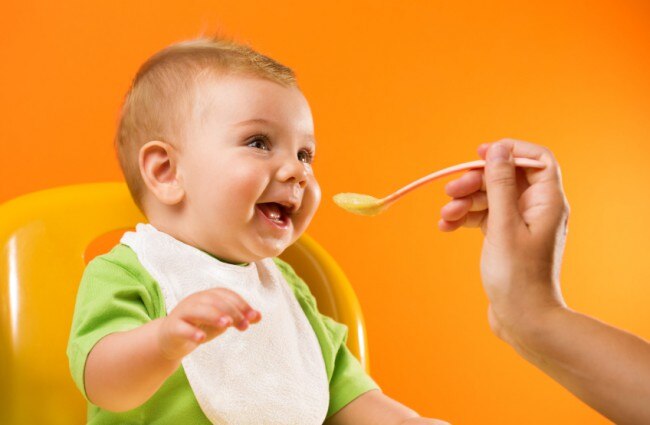Peas, string beans, butternut squash, carrots–the labels on those cute little jars of baby food sound so wholesome. But if you’re not choosing organic baby food, your baby’s first bites from a spoon might be anything but wholesome. Although the U.S. Department of Agriculture does not (yet) make claims that organic foods are more nutritious than conventional produce, here are 5 reasons why this mom of three thinks it’s not worth taking the risk on infant foods that don’t have the non-GMO, certified organic stamp.
1. To pass on the pesticides. Conventional farmers spray their crops with pesticides to avoid insects, mold and diseases from destroying their produce. Organic, non-GMO baby food manufacturers like Plum Organics and Happy Baby guarantee that they do not treat products with any potentially harmful chemicals–including pesticides, genetically engineered ingredients and growth hormones. Although the pesticide levels on non-organic fruits and vegetables used to make baby foods don’t exceed the government safety thresholds, after spending nine months carefully growing your healthy bundle of joy and another 4-6 months breastfeeding or choosing a high-quality formula, the notion of spooning up pesticide residue likely is a little more than you might want to stomach.
2. Because babies are more vulnerable to harmful ingredients than older children and adults. Your infant is developing rapidly each day, and that includes her gastrointestinal tract–making it harder for her to break down unwanted chemicals than it is for an adult or older child to get rid of these substances during digestion. This can result in your baby not fully absorbing nutrients that are important to her growth.
3. Because your infant consumes more fruits and vegetables than you do. Pound for pound, babies following the American Academy of Pediatrics dietary recommendations are going to be devoting a much higher percentage of their food intake to fruits and veggies than you will in a typical day. If a third or higher of her nutrition comes from baby carrots or squashed peas and you’re not either making your own baby food from organic produce or buying a brand like Plum Organics, you’re essentially flooding her system with chemicals that might not be healthy to her developing body.
4. To offer your child more nutritious fare. Some studies suggest that organic foods have higher levels of nutrition than conventionally grown foods. Plus, certain conventional brands of baby food contain fillers, starches and other things that your baby doesn’t need for optimal development. Make every morsel count!
5. To do the right thing for your local farming community. Shop at the farmer’s market with your baby in a carrier, exposing him to the sights, sounds and smells of fresh, locally grown foods, rather than pushing him in a metal cart through a cold, noisy store that supports mega-corporations above the regional farming community. Or buy baby food from companies that support organic farmers within their communities.
A quick word on cost: The American Academy of Pediatrics has hesitated to recommend organic baby food because of the concern that not everyone can afford to go this route, which can be more expensive. However, by making organic baby food from scratch, you’ll be spending much less per serving than you would at the store. (Spend $4 on an organic butternut squash, scoop out the flesh and puree it and you’ve got maybe 4 dozen ice cube trays filled with infant-sized servings of squash that can be frozen and fed until your baby is ready for table food!) Also, you can buy Earth’s Best, Happy Baby, Plum Organics and other non-GMO baby food brands for up to 50% retail if you shop online.

